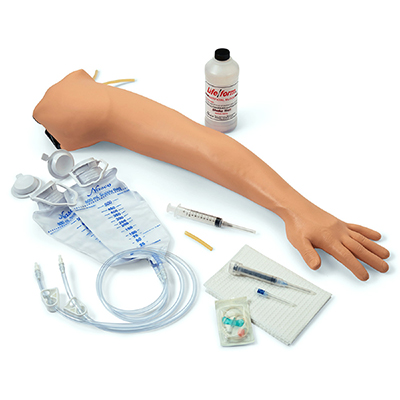IV (intravenous) practice kits are one of the most important tools for a future phlebotomist, nursing student, or any medical student requiring venipuncture training. They help to ensure that students have all of the proper tools for safe and effective venipuncture, as well as enabling them to practice on realistic replacement skin and tissue.
What Is a Phlebotomist?
A phlebotomist is a medical professional who specializes in drawing blood from patients for testing. They don’t just take blood from veins, although venous blood drawing is the procedure they are most known for. Phlebotomists also take small amounts of blood from capillaries, the small blood vessels in the fingers and toes.
IV Practice Arm for Injection Training
When selecting an IV practice arm kit, one should keep certain criteria in mind:
- It needs to be easy to use.
- It needs to be easy to clean.
- It needs to be durable to withstand repeated sessions of phlebotomy training and practice of IV techniques.
- It needs to be accurate because an IV training kit does no good if it doesn’t properly replicate real-life healthcare situations.
It’s also helpful to look for a phlebotomy arm with a sealant that reseals the injection site, both to prevent leakage (if the phlebotomy practice kit has fake blood) and to allow it to be reused. For example, the Simulaids Advanced Venipuncture and Injection Arm features multiple sites for IV injection, plus sites for intramuscular and intradermal injections. It also comes with two quarts of simulated blood with aerosol sealant and other accessories.
Another aspect of a venipuncture practice kit is the inclusion of different arm sizes to simulate different patients. Laerdal Multi-Venous Training Arms come in male, female, and pediatric forms, each with a different SKU for ease of online checkout.
The best IV practice kits include a wide range of injection and blood draw supplies to maximize training. The right tools will help you develop the skills needed for administering injections, as well as confidence in your ability to perform this procedure safely. A good kit will have different kinds of needles, with differences such as:
- Needle gauge, length, and type
- Needle shaft material
- Needle hub material (if applicable)
- Needle tip material (if applicable)
Ease of Cleaning
The best IV practice kit needs to be easy to clean to use over and over again. This means that the venipuncture arms are made of a material that is easy to wipe down and sterilize. They should also be able to withstand blood and water without rusting or corroding.
You’ll want the IV practice kit to include an alcohol or medical-grade disinfectant spray so you can clean the venipuncture arms after each training session. The apprentice is not just learning IV skills, but the importance of sterilization. There should also be a spare set of needles available in case one breaks during a puncture attempt.
A Good IV Practice Kit Makes Perfect
The best IV practice kits have a wide range of injection and blood draw supplies, as well as realistic replacement skin. They are easy to use and have comprehensive anatomy so students can learn step-by-step how to perform all aspects of IV procedures safely. Proper training reduces patient discomfort and reduces the possibility of needle stick injury.
The experts at Penn Care can help with all your training needs with a full line of training arms, manikins, and supplies available. Contact Penn Care today!



